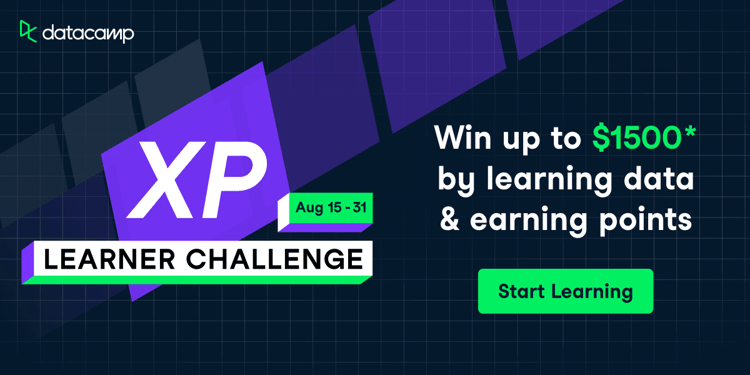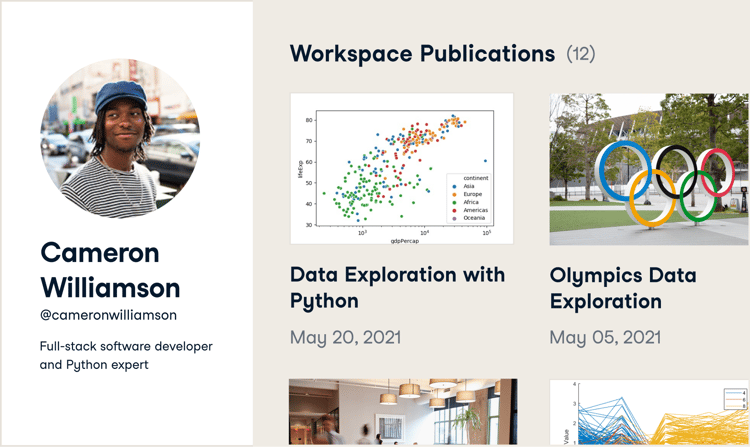Our mission has always been to enable learners to go from learning to working in data at a fraction of the cost of a college education.
Portfolios are an incredible way for anyone from any background to get a job with data. To evolve our mission and empower more people to turn their data projects into career opportunities, we’re extremely excited about the launch of DataCamp Portfolios.
With DataCamp Portfolios, we’ve made it easy for anyone to build a high-quality data portfolio in minutes. To celebrate all the wonderful portfolios you'll be creating, we are launching the portfolio challenge!
The challenge not only gives you a platform to easily share and elevate your best work through building a stunning portfolio from scratch, but you will also put yourself in contention for winning up to $500 in the process.
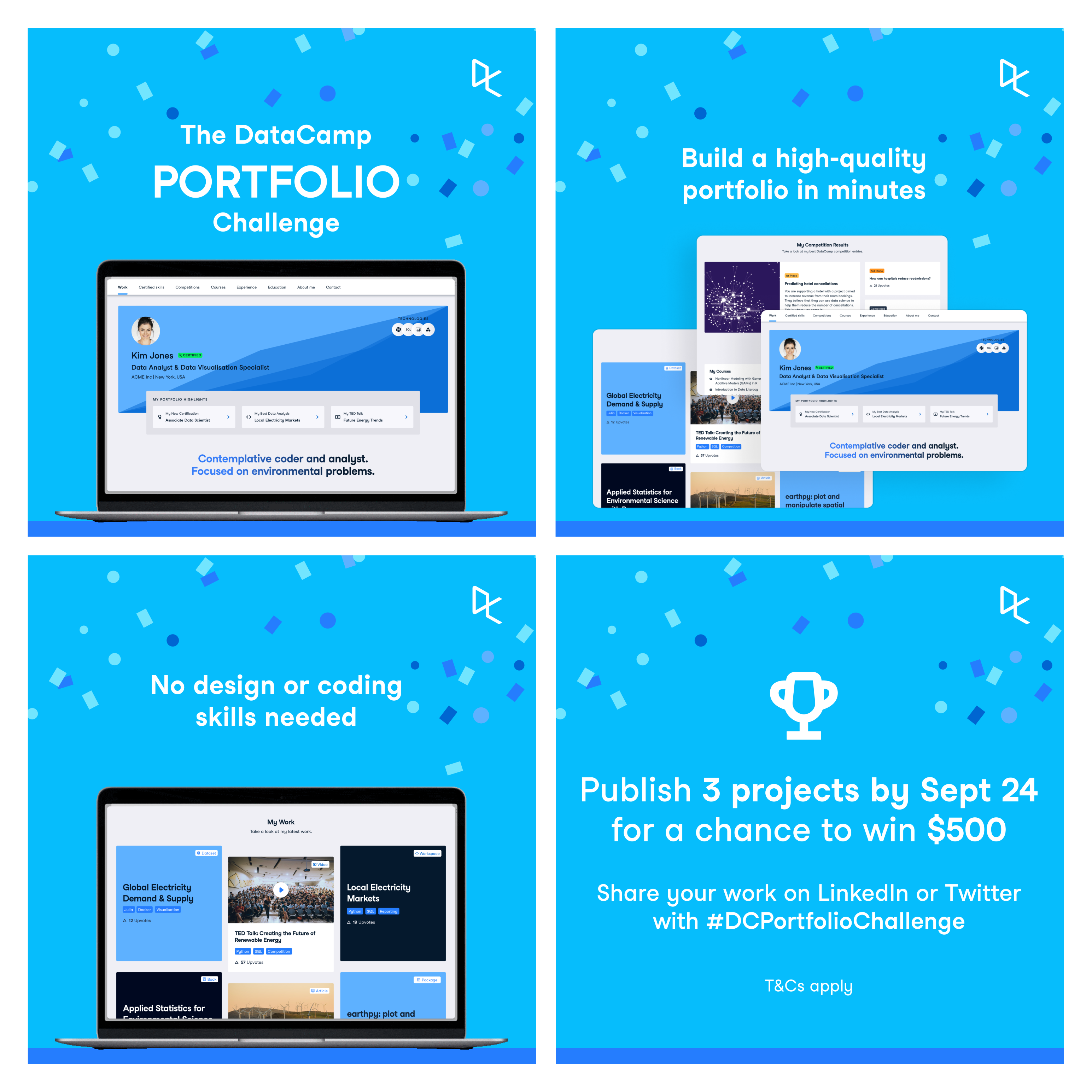
With DataCamp Portfolio, you can:
- Seamlessly build a stunning data portfolio without technical or design skills.
- Add your projects, data, and contributions in data science from a variety of sources, including GitHub, DataCamp Workspace, Kaggle, Google Colab, Tableau Public, and more.
- Showcase all the learning you’ve done on DataCamp and elsewhere.
- Easily add any tutorials, articles, publications, or relevant content you’ve created with just one button.
- Save time in maintaining and improving your data portfolio, and share it using a simple link.
How to get started with DataCamp portfolios
Accessing the new data portfolio within DataCamp is simple.
Log in to your DataCamp account, navigate to your Portfolio through the main navigation, and you'll find a curated collection showcasing your achievements which you can edit to highlight your expertise.
Craft an immersive narrative of your data journey by seamlessly integrating various elements into your portfolio. Include datasets, books, articles, podcasts, videos, and projects that have played a pivotal role in shaping your data journey.
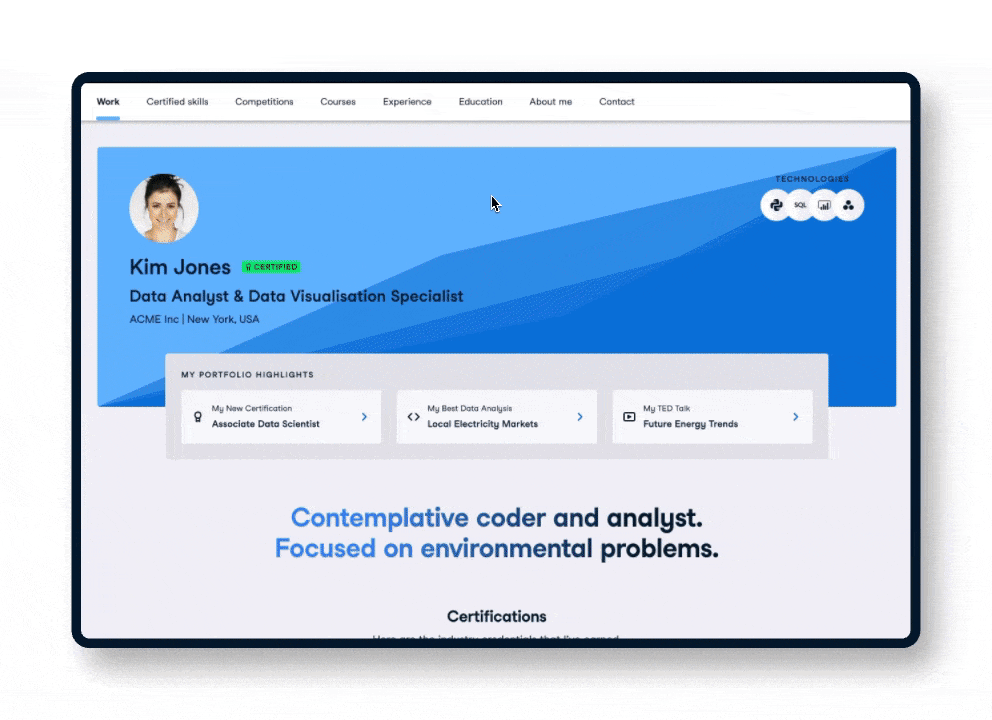
Build your data portfolio
Showcase your skills and projects in minutes.
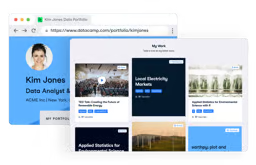
The Portfolio Challenge: Win $500 Building Your Portfolio
Now that the data portfolios are live, we want to celebrate all the incredible creations from learners by launching the #DCPortfolioChallenge.
Starting on September 5, learners can battle it out to win a host of awesome prizes whilst showcasing their best work.
Participating in the portfolio challenge is really simple—here’s what you need to do:
- Build a data portfolio that contains the minimum requirements for an eligible portfolio
- Set your account to public (so we can see what you've created!)
- Share your portfolio on LinkedIn or Twitter with the hashtag #DCPortfolioChallenge
- Keep your eyes on DataCamp socials and your email inbox—all winners will be contacted on October 9 regarding how their prizes will be awarded
The competition will run exclusively on DataCamp’s social channels. So make sure to use the hashtag #DCPortfolioChallenge wherever you post your portfolio to be entered into the competition.
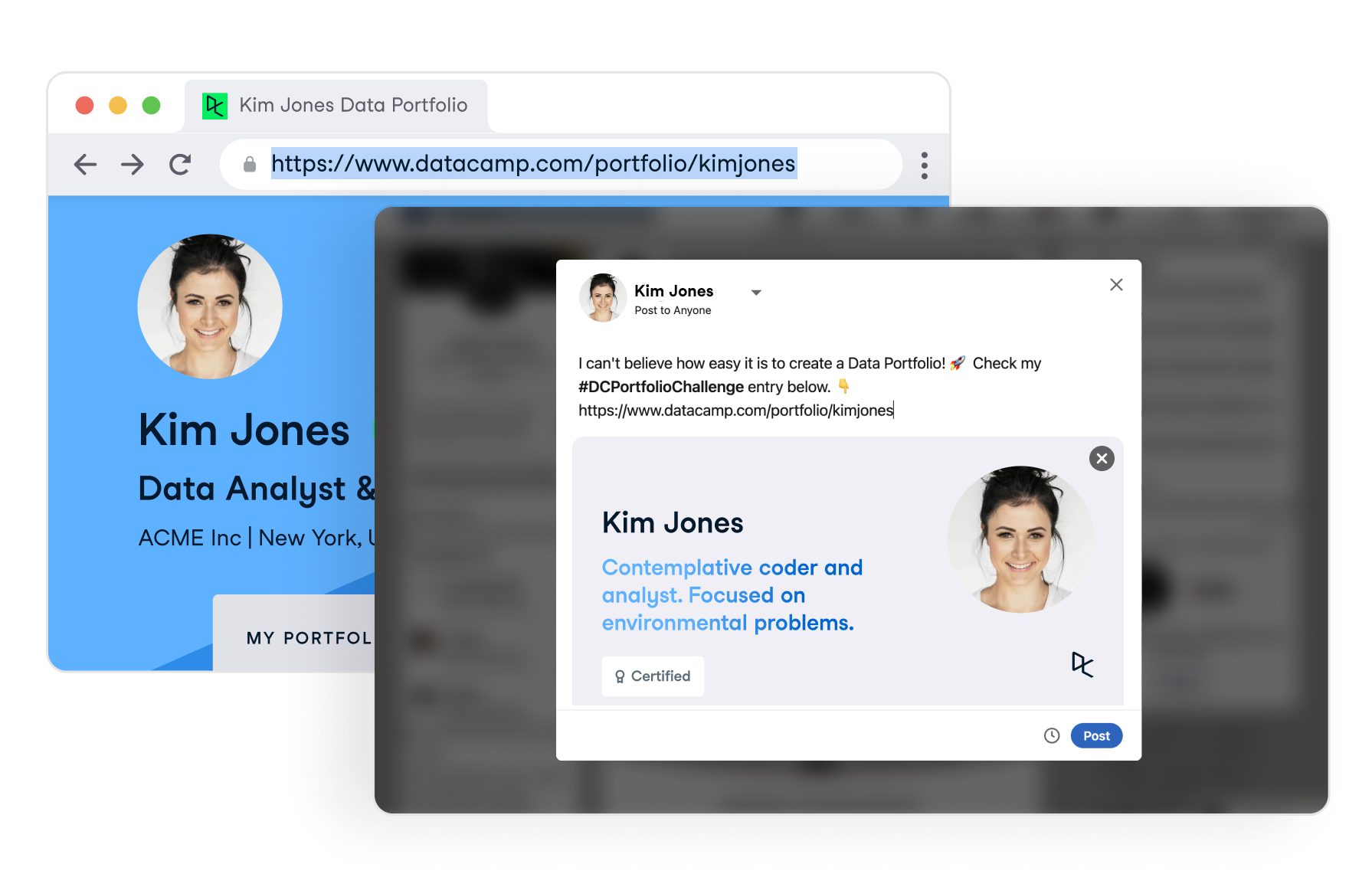
Below you will find important information on the specifics of the competition.
Who is eligible for the Portfolio Challenge?
Anyone with a DataCamp account—registered or paid subscriber—is eligible.
Portfolios are communal in nature, so we want this to be accessible to everyone within the data science community. As such, we carefully designed the competition so that DataCamp Premium subscribers do not have any advantage in winning the competition.
If you are not a registered user, simply create a DataCamp account here to access your free Portfolio, alongside the ability to create three separate DataCamp Workspaces.
What makes an eligible portfolio?
To make the competition fairer, more exciting, and encourage vibrant and beautiful portfolios in the competition we are introducing requirements for what constitutes an eligible portfolio for the competition. As such, only the following portfolios will be eligible for the competition:
- Portfolios where a full name is included (note this can also be an avatar name or a nickname)
- Portfolios where affiliation is included (e.g., education, company, etc.)
- Portfolios containing a profile image (note this can be an avatar, an AI-generated image, etc.)
- Portfolios containing a short description in the about me section (more than 100 characters)
- Portfolios with a filled-out “Work and Education” section
- Portfolios with at least two types of entries signifying contributions to data science—this can be anything of the following:
- A course completion on DataCamp or any other platform (note, this also applies to any free course on DataCamp)
- A link to a project hosted online (GitHub, Tableau Public Page, DataCamp Workspace, Google Colab, etc.)
- A link towards an article/publication on your own self-hosted blog post or an external publication (DataCamp Blog, Towards Data Science, Medium, LinkedIn Post, etc.)
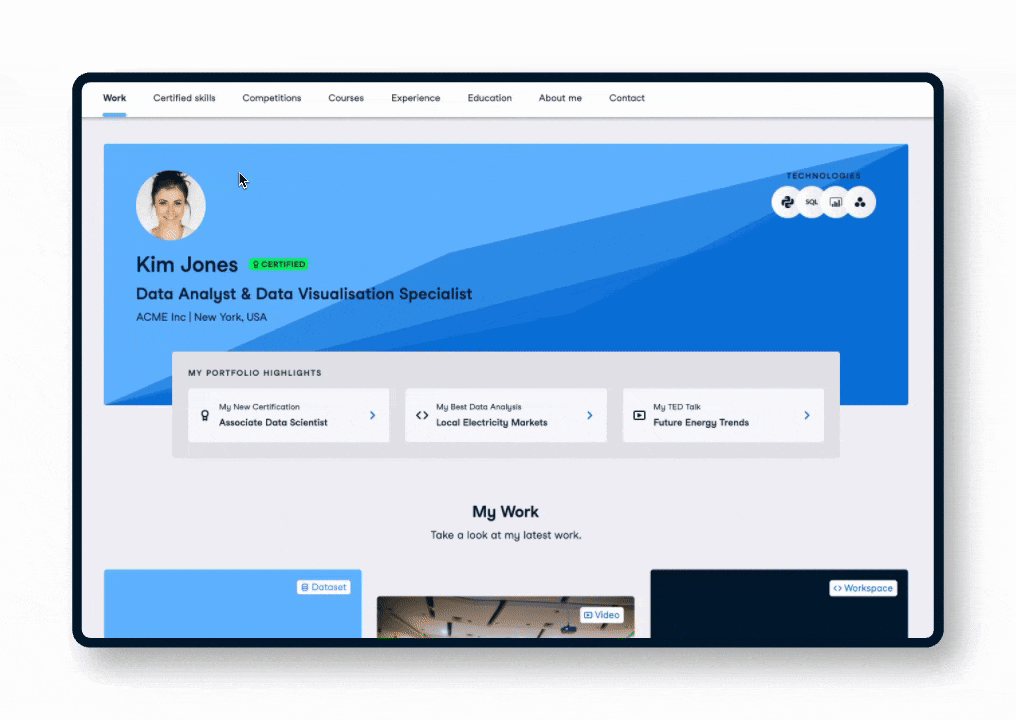
For how long will the competition run?
All projects must be created and shared by Saturday, September 23, 2023.
How will my portfolio be judged?
A panel of DataCamp experts will evaluate the portfolios. Judges will focus on completeness (10%), quality of projects (80%), and creativity and storytelling (10%). Scroll down for the complete scoring rubric.
The rewards
- First Place: The winner will be awarded a cash prize of $500
- Second Place: The first runner-up will be awarded a cash prize of $100
- Third to Fifth Place: Runners-up will receive $50 Amazon Gift Cards
The DataCamp Portfolio Challenge Scoring Rubric
As mentioned above, we have carefully designed the challenge so that there is an equal chance of winning between free registered learners, and DataCamp Premium subscribers. Below, you will find a detailed scoring rubric we will be applying throughout the competition. For more details, you can also visit the portfolio challenge terms of service here.
Portfolios will be scored across three categories to equal a score out of 100.
Completeness (10%)
At a minimum, portfolios should have the eligibility criterion outlined above. For additional completeness points, we encourage having varied types of entries in a portfolio. Varied entries mean having different types of entries in your portfolio, from courses to projects, to publications, and more! (Be creative!)
If your projects also cover different technologies and tools, that also contributes towards completeness.
To create an even playing field between anyone subscribed or just registered to DataCamp, we want to clarify the following. The competition will focus on variety/quality, not quantity of entries. For example, you do not gain any additional points on completeness if you have taken more than one DataCamp course or include any premium DataCamp content in your portfolio (e.g., projects that are behind a paywall).
Variety & quality of projects (80%)
The cornerstone of any portfolio is projects! Naturally, this is why projects carry the most weight while we evaluate winning portfolios. Projects will be evaluated based on the following criteria:
- The number of self-led projects you’ve created for your portfolio (By self-led, we mean where you choose to work with a dataset of your choosing — as such, DataCamp Projects do not apply here)
- The originality of your projects, from the datasets used to the techniques and analysis you apply
- The variety of the use cases in your projects. If projects pertain to different industries, use cases, and technologies—that is a plus.
- The presentation and storytelling in the projects (i.e., if your projects are presented and introduced effectively).
Important to note: In the spirit of an even playing field, we do not have a preference between DataCamp Workspace and other cloud-based IDEs (Google Colab, etc.) or platforms to post a notebook (e.g., uploading to GitHub). If a data project can be posted there, it is eligible.
Creativity & storytelling (10%)
We’re looking forward to seeing the creative use of portfolio profile features like images, the tagline, and more. This is your chance to think outside the box and surprise us!
Good luck! We’re excited to see our community push their Portfolios to their creative potential.
Still have questions? Check out the full Terms and Conditions here.
